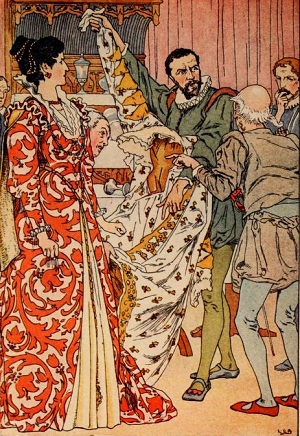| directory |
| home | contact |
|
|||||||||||||||
| search | |||||||||||||||
Shakespeare's Characters: Petruchio (The Taming of the Shrew)From The Works of William Shakespeare. Vol. 10. Ed. Evangeline Maria O'Connor. J.D. Morris and Co.Petruchio is like Faulconbridge in making himself out worse than he really is. Though he declares his object is only to wive wealthily, and Grumio says he'd marry any foul old hag with money, yet this is plain exaggeration. He's one of those men who like a bit of devil in the girl he marries and the mare he rides. "None of your namby-pamby ones for me." He knows he can tame her: if she is sharp-tempered, he is sharper. It's a word and a blow with him, as Grumio has experienced. When he hears of Kate, he won't sleep till he sees her; when she comes, he takes the lead and keeps it. He means to have it and her. He ridicules her in such a pleasant, madcap fashion, that one can't help liking him. He understands women, and flatters her. Note the limping touch. He praises her beauty; promises her finery; keeps her waiting; makes her put up with his dress, and tremble at church; outs with his sword and makes her go with him; declares his wife's his chattel; leaves her horse on her when she falls during the journey, and makes her beg for Grumio; will give no choleric food to choleric folk; in fact he "kills her in her own humour"; tames her by pretended love; starves her till she thanks him for meat he's dressed; and then when her food has made her saucy, and she rebels again about her dress (which was indeed enough to make the most angelic woman's temper rise), he beats her in the old way by pretending to sympathize with her. Then he stops her going home, because she won't say two is seven. When she gives in, he no doubt tries her too hardly, but then she has tried him before, and the result is that they two alone are married, while the other two, Hortensio and Lucentio, are only "sped." ("Let us hope though," says Miss Constance O'Brien, "that Petruchio gave up choosing Kate's dresses and caps.") If Petruchio is not a gentleman, and Kate not a lady, their day differed from ours: they were a happy couple, we may be sure. Kate would obey him with a will, for her husband had fairly beaten her at her own game, and won her respect. Furnivall: The Leopold Shakespere. ___ Related Resources |

|
©1999-2021 Shakespeare Online. All Rights Reserved.